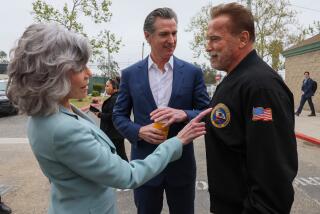After Sterling, NAACP’s role in oil drilling fight draws questions
It was a packed house last week when the Carson City Council debated whether to extend a temporary moratorium on oil drilling in the city. Residents were divided, and oil giant Occidental Petroleum was pushing to lift the ban.
There were dozens of speakers, including two representing local chapters of the National Assn. for the Advancement of Colored People.
Leon Jenkins, then the head of the NAACP Los Angeles Chapter, told the council it was crucial to lift the moratorium to help generate new jobs and revenues for City Hall.
At the time, Jenkins was in the news after he gave a news conference explaining his NAACP chapter’s close ties with L.A. Clippers owner Donald Sterling. But what the audience didn’t know was that Occidental Petroleum had donated $9,000 to the NAACP between 2010 and 2012.
An Occidental spokesman said the donations were designed to boost minority community outreach programs. Spokesman Forrest Beanum said the oil company reached out to dozens of organizations, including the NAACP, to urge them to attend the meeting. But he said that call was not connected to any donations the company made.
“We routinely support the NAACP and its mission, typically pledging $3,000 per year to the organization from our Los Angeles office,” Beanum said in a statement. “We plan to continue our support.”
The donations were sent directly to the national headquarters in Baltimore, he said. Jenkins had no business relationship with the company, Beanum said.
Jenkins did not return calls seeking comment. Last week, he resigned as head of the Culver City-based NAACP Los Angeles Chapter amid criticism over the group’s ties to Sterling.
Sterling had donated $45,000 from 2007-2010 to the local NAACP chapter, according to tax records. The civil rights group granted Sterling an award in 2009, the same year the real estate magnate and L.A. Clippers owner paid $2.73 million to settle U.S. government claims that he refused to rent his apartments to Latinos and blacks.
The NAACP was scheduled to give him with a second lifetime achievement award at its May 15 banquet when a tape was made public in which Sterling is said to have told a female friend not to associate with black people. That tape prompted the NBA to impose a lifetime ban on Sterling.
The NAACP withdrew the second award after the tape became public. But that didn’t stop the criticism. Jenkins resigned last Thursday after his past problems came to light. He had been removed from the bench by a Michigan Supreme Court, which found “overwhelming evidence” that Jenkins “sold his office and his public trust,” according to the bar records. He was disbarred in Michigan in 1994 and California in 2001.
After Jenkins’ resignation, the national office vowed to develop “guidelines for its branches to help them in their award selection process.”
At the Carson council meeting, Jenkins said it was important for oil drilling to resume.
“If you don’t get jobs then the city dies because people move out,” he said. “ It is very important that we add jobs.”
Joseph Alford, the president of the Carson/Torrance chapter of the NAACP, attended the meeting with Jenkins.
“We wanted to lift the ban. That’s why were there,” Alford said. “We help people. If somebody has a problem then we work with them to fix it.”
Some Carson residents said they were puzzled by why Jenkins attended the meeting.
“He certainly knew nothing about our community, he certainly couldn’t represent anything here,” said resident Dianne Thomas, an oil drilling opponent.
There was not enough support on the council to keep oil drilling moratorium, so it was lifted.
Times staff writer Christine Mai Duc contributed to this report.
More to Read
Start your day right
Sign up for Essential California for news, features and recommendations from the L.A. Times and beyond in your inbox six days a week.
You may occasionally receive promotional content from the Los Angeles Times.







